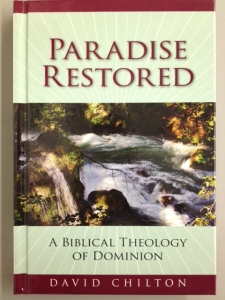
If you have never read anything by David Chilton, and you only wanted to buy and read one of his books, Paradise Restored would be the one to get.
Of course, after you’ve read Paradise Restored, you WILL want to buy and read his other books!
David Chilton was an extraordinarily gifted writer. I say was because he passed away in 1997. And I say extraordinarily gifted because his writing warrants that. It is everything I would want my own writing to be–interesting, informative, innovative, insightful,… I ran out of “i” words. Too much Reconstructionist writing is geared to the upper eschelons of Christian scholars and academics and intellectuals. Not that that is a bad thing. Except that this leaves the rest of us a little cold when we’re trying desperately to warm up to the incredibly powerful (interesting, informative, insightful, though not, in my opinion, biblically speaking, innovative) ideas of Christian Reconstruction.
Chilton never had that problem. Gary North says this in his Foreword to the book:
If someone were to ask me, “What is the best presentation of biblical eschatology that you have ever read?” I would answer, “Chilton’s Paradise Restored.” If someone else were to ask me, “What is the best example of biblical expository style that you have ever read?” I would say, “Chilton’s Paradise Restored.”…
Paradise Restored is unique for its combining of clarity, precision of exposition, and text-connection. I do not recall reading any theological treatise that matches it for its combination of these three virtues….
Rare is a theological treatise that is a page-turner. This one is.
To which Gary adds,
David Chilton (1951-1997) was the most gifted writer I have ever worked with.
Well. Now that we’ve established that the man could write, let’s take a look at what he wrote in Paradise Restored.
I think what I will do first is give you a sort of “survey” of the book. A bird’s eye view. An initial fly-over. And then, perhaps in another post, I will turn around, swoop down a little lower and take a closer look. The edition I am working with is the 2007 hardcover edition published by Dominion Press (same pagination and formatting as the original 1985 and in subsequent printings). It is a beautiful book, with a gorgeously designed cover, and 300+ pages of clear, very easy to read type. (“Very easy to read” because of the font and size and also because Chilton’s prose is as crystal clear as the water in the cover photo!)
PARADIGM RESTORED
Don’t let the title–or the subtitle–fool you. This is not a dense, ponderous tome filled with obtuse, other-worldly or even utopian language. It is a rock-solid, intellectually pulsating, tightly-focused, vibrant little book, And it challenges probably every single evangelical Christian (and let’s not leave out Reformed, Protestant and even Roman Catholic!) myth and misconception that there is out there regarding Biblical symbolism, apocalyptic imagery, prophecy and eschatology. But, again, these are not the wild, theological musings of a disconnected scholar. This is an extremely down-to-earth, warm and affectionate, albeit unconventional treatment of the subject–which is why I think, perhaps, a better (or at least a more descriptive) title and subtitle would be, Paradigm Restored: Why Almost Everything You’ve Ever Been Taught About Biblical Symbolism, Eschatology and Prophecy is Just Plain WRONG!
Anyway, after a brief Foreword written by Gary North and an even more brief Preface by Chilton, we get down right away to brass tacks. (Not literal ones, of course.) The contents of the book are as follows:
Part I presents The Hope–what Chilton calls, “An Eschatology of Dominion”–even answering the question, “What Difference Does It Make?”
Part II is: “Paradise: the Pattern for Prophecy,” which lays the groundwork for the rest of the book, i.e., how we are to properly understand all the imagery, symbolism and various “word associations” that the Bible presents to us (which, I believe, are for our edification and practical and ethical instruction, and NOT for our idle speculations and mystery-loving-but-hermeneutically-lame interpretations. But I digress!).
Part III presents “The Gospel of the Kingdom.” This is the largest section of the book. And rightly so. This is where the lion’s share of prophetic, predominantly evangelical Christian myths about “the coming of the Kingdom”, the restoration of Israel, the Great Tribulation, the Antichrist, the Last Days, the Day of the Lord, etc., are lovingly and patiently debunked by Chilton. He is like a kindly, country doctor dealing with a fevered, diseased patient who is highly misguided and misinformed about his condition and the true remedy that the Great Physician has designed for him. Dr. Chilton has the cure (and it ain’t brain surgery)!
Part IV, “Studies in the Book of Revelation” tackles everybody’s favorite “apocalyptic” book of the Bible. The trouble is, as Chilton points out, Revelation is not apocalyptic the way most people think of that word–i.e., unexplained, unintelligible, mysterious symbols. The Apostle John wrote his book as prophecy, the purpose of which (as Chilton reminds us) is ethical, the same as all other biblical prophecy. And it is to REVEAL something that God wants us to know, not conceal it. It was not written to be speculative and it was certainly not intended by God to remain hidden from his readers.
Now, I don’t want to be a spoiler here, but on this point I absolutely HAVE to quote Chilton regarding John’s use of symbols in the book of Revelation, which is in stark contrast to the writings of the other, so-called “apocalyptic” writers of his day, whose writings were predominantly pessimistic and deliberately made obscure:
John’s approach in the Revelation is vastly different. His symbols are not obscure ravings hatched from a fevered imagination; they are rooted firmly in the Old Testament (and the reason for their seeming obscurity is that very fact: we have trouble understanding them only because we don’t know our Bibles).
Ouch. Scripturally sound chastisement administered by God via his Spirit-filled minister “hurts so good”! We evangelical Christians–even self-professing Calvinist Christians–can sometimes be abysmally ignorant when it comes to understanding the plain teachings of Scripture.
Part V, “To the Ends of the Earth,” is very short and covers “Fulfilling the Great Commission.” Here, Chilton emphasizes the comprehensive aspect of the Gospel message and its long-term transformational effects on the nations of the world.
Appendix A summarizes the eschatology (last days timetable of events) of Hope: it is postmillennial, and therefore much misunderstood by those who do not subscribe to it.
Appendix B, “Josephus on the Fall of Jerusalem,” at first doesn’t seem to belong in this upbeat, victorious-sounding book on the salvation of planet earth in history before the Lord returns. But that horrendous, intensely evil and indescribably satanic and depraved event (or series of events) that Josephus very prudently and delicately describes plays such a fundamental role in prophecy and is so essential in helping Christians rightly understand and interpret Jesus’ words in the Gospels and John’s words in Revelation regarding Jerusalem and the Jews of the 1st Century A.D., that to leave it out would remove the entire historical basis for the biblical theology of Chilton’s book and thus leave it without any foundation or historical context for us to believe it. Chilton was wise to include it.
Bibliography and indexes round out the remainder of the book. Simply amazing reading!
There are so many “aha” moments and “duh” moments and “well, now, that makes perfect sense to me” moments throughout this entire book, that I am going to share a few of those with you. As I said, I will come back with some choice selections and cover this marvelous book, Paradise Restored, a little more in depth in my next post.
Until then, I EXHORT you, get this book and read it for yourself! It will disabuse you of a thousand misguided theological and eschatological notions that you have swirling around in your brain right now.
Get it for free here (1994 edition, PDF download from Gary North’s website): http://www.garynorth.com/freebooks/docs/21de_47e.htm
Or, order it brand new, hardcover, from American Vision here: http://www.americanvision.com/products/Paradise-Restored%3A-A-Biblical-Theology-of-Dominion.html
 Here is a real treat. A series of lectures on the Book of Revelation given by Rev. David Chilton several years before he died. He died in 1997. I’m not exactly sure when these were recorded. Probably in the late 1980s.
Here is a real treat. A series of lectures on the Book of Revelation given by Rev. David Chilton several years before he died. He died in 1997. I’m not exactly sure when these were recorded. Probably in the late 1980s.